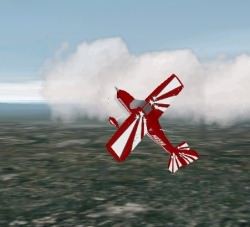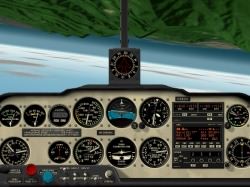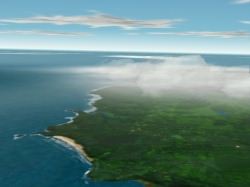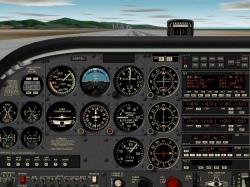By: Ed Reddy
Date: 1999-08-13
ProPilot 2000 is nearing beta, and looks to improve over ProPilot '99 in virtually every way. We fielded an interview to the PP2000 team and will do a hands-on report as soon as it becomes possible.
Q. What improvements will we see over ProPilot2000 from the 99 version?
A: Beginner Assistance: From Pro Pilot's inception two years ago, we have always focused on the core consumer, who are very savvy when it comes to aviation. As the interest for general aviation has grown, we have created a product that has "Auto" functionality or "Manual" functionality.
Auto is for a user that may not have any aviation experience. In this mode, we have a one-keystroke selection to start the aircraft engine, with an audio co-pilot to handle all radio communications, while providing audio assistance on flight maneuvers. Manual functionality is for the more experienced aviators who wish to procedurally perform all of the piloting tasks.

Decathlon
Aircraft: For those core consumers who have requested an aerobatic airplane, your prayers have been answered. Pro Pilot 2000 has incorporated the American Champion Decathlon 8KCAB to its list of fully functional aircraft.
Navigation and ATC
· New in-dash GPS: The Pro Pilot series was the first flight simulation to include a Global Positioning System right out of the box. Now, this GPS system is mounted within the cockpit panel of each aircraft and is coupled with a moving map display.
Air Traffic Control: Listening to our core audience, we have placed major emphasis on creating an ATC system that is completely realistic. See next question
Weather Systems: The Pro Pilot series was the first simulation to capture the true essence of cloud formations and translucency. To bring more real world weather to a desktop, Pro Pilot 2000 will provide automatic, dynamic, and adverse weather conditions for real-world beauty and real-world challenges. - Weather includes: Precipitation, hail, snow, lightning, thunder, and turbulence
Geography and Flight Planning
Geography: Over 38 million elevation points from the U.S. geological survey data- used to insure precise elevations of mountain ranges and terrain. This creates a 3-dimensional world of quality and true-to-life viewing of your favorite snow-capped mountains, hills, canyons, and valleys.
With 37 major metropolitan areas Pro Pilot offers more metro areas than any other flight simulation without the purchasing of add-on packs. Each city is reproduced in photographic detail, while surrounding areas cover an additional 20 square miles. That's over 14,800 square miles of photo realistic terrain.
Additions to the Flight Planning Wizard: This simple select and click wizard allows an individual to select a departure airport, arrival airport, aircraft, and the waypoints in between destinations, and much more. Or, let the Flight Planning Wizard's Automatic Route Generator select the waypoints in between your departure and arrival automatically. If you do not like the waypoint selections, you can always change those to your satisfaction.
Once your aircraft, departure, destination, and waypoints have been selected, the Flight Planning Wizard will provide weather information, fuel consumption, travel time, wind velocity, wind strength, and waypoint frequencies. Users can customize weather, select dynamic weather or adverse weather conditions. SIDs, STARs, Approaches and alternate airports can also be selected.

Q. One of the features of PP99 were the ATC communications, has this been changed in PP2000?
A: The ATC system of ProPilot 2000 will be the best in the industry. Complex airspace and vectoring models were implemented to ensure flawless vectoring creating an authentic ATC experience. A complete frequency database and approach vectoring provides the user with familiar and realistic ATC at their home airport and abroad. ATC includes: Multicom, Unicom, FSS, ASOS, AWOS, ATIS, approach, center, departure frequencies, pilot chatter, and additional support for VFR & IFR terminal procedures.

Decathlon Panel
Q. A big limitation of PP99 was graphics, 3dfx only at 640x480. What graphic cards are supported in the new version and what are the graphic resolutions?
A: Pro Pilot will have new graphics support in addition to the existing 3dfx support. Screen resolution has been increased to 800x600.
Q. The flight planning Wizard was a great feature of PP99. Can we expect to see any new tools?
A: The flight-planning wizard has been updated to reflect advances in the ATC system, co-pilot assistance and the weather system. You will be able to customize the flight by using the menu options and dialog screens.
New Aircraft
Q. There were 6 flyable aircraft in PP99. What new aircraft can we expect to see in PP2K?
A: We have looked at the advances in the Pro Pilot system and have included two aircraft that are new to the ProPilot series. We have replaced the older 172P with Cessna's newest model 172, the 172SP (Special Performance). We have also included a fantastic tail wheel/ basic aerobatics trainer: the American Champion Aircraft Super Decathlon. The other aircraft in ProPilot are: Cessna 172R, Beech Bonanza V35, Beech Baron B58, Beech KingAir B200 and the Cessna CitationJet Model 525.
Q. One feature I loved about PP99 was the clickable cockpit. Are there improvements to the cockpits of the existing aircraft with respect to added functions and clickable controls?
A: Since all of the panels were reconfigured for the new, high-resolution support, we were able to implement several aircraft specific features not seen before. Complex autopilot panels, flashing annunciators, in-dash GPS and complete EFIS systems are among the additions to the aircraft panels. All usable controls and features on the panels continue to sport the clicking features from previous Pro Pilot releases.
Q. What new scenery can we expect to see in PP2K?
A: In addition to the current US, Canadian and Western European scenery, we have added Hawaiian scenery to the mix. With two fully photo-realistic islands, accurate elevation points, two new metro areas of Honolulu and Hilo, and additional airports, we think this is a great addition to the existing Pro Pilot scenery.
Q. The clouds and wind effects in PP99 were excellent. What have you added to the weather in PP2K?
A: We have taken the wind effects a step further and use an automated generation system that will generate realistic winds aloft. The turbulence model has been modified to give increased randomness and authentic feel to the effects of turbulence and wind on your aircraft. We are also exploring other weather effects based on the new graphics support.
Multiplayer?
Q. One feature I thought was missing from PP2K was the ability to fly on-line with friends. Is PP2K still a stand-alone product or will I be able to fly multiplayer?
A: This release of ProPilot will still be a stand-alone product with no multiplayer ability. You will, however, be able to share scenic and challenge flights as well as flight plans over the Internet.
Q. PP99 had an extensive training program built in. What improvements are there in training for the novice pilot?
A: Exceptional beginning assistance is available. We have made it easier to just "get in and fly" with a single key starting sequence for beginner pilots. We have added audio instructor assistance and in conjunction with the "First Flight" demo videos, we are certain that the first hour of use by the beginning user will be productive and allow them to utilize all of the features of ProPilot in no time.
Advances in the co-pilot assistance are being implemented as well. Audio Checklists and radio and navigation assistance will lighten the workload of the sim pilot.
Q. Will we have the ability to add additional aircraft or detailed scenery in PP2K as in Flight Simulator 98/2000?
A: We are currently looking into this scenario with some key 3rd party developers.
Flight Dynamics
Q. What improvements have you made in the physics modeling?
A: Our flight dynamics engine has been redesigned utilizing quaternion mathematics to improve flight modeling for all aircraft. The quaternions are used to represent orientation, a technique which creates a smoother sense of motion.

Hawaii Scenery
Vector based physics models are subject to discontinuities resulting from singularities in the math; substituting quaternion equations avoids this. Even aside from avoiding these disruptive mathematical singularities, quaternion based motion models have far smoother, more realistic flight qualities than equivalent vector based models.
Using this method, we are able to model aircraft stability in an accurate fashion without sacrificing any control authority. These changes will also make aerobatic and "outside the envelope" maneuvers possible.
Q. Are there improvements in the navigation aids such as VOR and NAV?
A: All of the navaid data has been revisited and updated to reflect some minor improvements, but the biggest navigation feature is the in-dash GPS and it's integrated pop-up moving map display. We have scrutinized several real world GPSs and extracted the features of several different model in order to create the most advanced, but easy to use, GPS on the market.
Each aircraft has a GPS that many will find familiar, but the data entry and GPS navigation functions have been modified to allow a simple one-click interface for all of the GPSs main functions. The GPSs are being tested and approved by Global Navigation Services, one of aviation's foremost authorities on Global Positioning Systems.

Cessna 172R Panel
Q. Have you added dynamic scenery (air traffic) to PP2K? What can we expect to see?
A: Included in the advances to the ATC system is a complete dynamic traffic interface. You will be able to see, and hear the dynamic traffic, and if using the ATC system, also be interacting with the controller in order to see and avoid that traffic.
Note: there will be a rebate offer for owners of ProPilot '99.